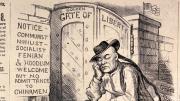Regularly the dismal news streams in from Japan. The "lost decade"--dating from the early 1990s, when the country's seemingly invincible economy began to derail--shows no sign of ending. The high public-approval ratings for wavy-haired maverick prime minister Junichiro Koizumi, who electrified voters with a call for sweeping reforms and led his Liberal Democratic Party (LDP) to victory in the Upper House election last summer, offer no guarantee that a turnaround is in sight. Indeed, virtually every economic indicator shows the nation sliding once again toward deep recession from its present position of grave weakness: gross public debt is more than 130 percent of Japan's annual economic output, and the unemployment rate is officially 5 percent (twice that if U.S. counting methods were used, many experts say)--the highest level in almost half a century.
Americans wonder why Japan appears gridlocked, incapable of coming out of its economic malaise and thereby helping the world economy to recover. And certainly Japanese themselves worry deeply about their future. Yet there is a striking disconnect between what the economic data say and how people live their daily lives. By a great many yardsticks and for most Japanese people, the lost decade has been surprisingly good--which may be why leaders and public alike have been so reluctant to bite the economic bullet.
The bare outlines of what went wrong are not disputed. In the mid 1980s, a strong yen sent the value of stocks and land soaring. When the bubble burst, prices plunged and financial institutions that had made loans using the over-valued assets as collateral were left with a staggering volume of nonperforming loans, triggering a major financial crisis. Ask Japan's leaders today why they have failed to restore the economy to health, however, and consensus dissolves into finger-pointing. Among the accused are feckless bankers who, caught short by their lax lending policies (and protective of borrowers), failed to call in the bad loans; financial regulators who didn't discipline them; finance ministry bureaucrats whose fiscal remedies have been ill-conceived, inadequate, or ill-timed; LDP leaders who have protected a herd of sacred cows when the need to clean house was obvious; opposition leaders who offered voters no clear alternative; and a public that has been waiting for painless solutions while Japan's economic problems steadily worsened.
Beyond all this fault finding, and despite dire Western press reports of pending economic collapse, daily life in Japan for the great majority of people is remarkably prosperous and comfortable. In 1999, among the world's nations only Switzerland exceeded Japan in economic output per capita (at $34,500, as compared to $33,900 for the United States). Falling prices--even if they signal Japan's economic ill-health--are a boon for consumers. Taking into account purchasing parity, a Big Mac now costs more in New York, according to the Economist, than in Tokyo. The spread of discount stores with inexpensive imports from elsewhere in Asia has increased shopping options. Home ownership is as common in Japan as in the United States--and well ahead of the level in some other rich countries such as Germany.
Although low consumer spending impedes economic recovery, marks of affluence are everywhere. Japan's name-brand-conscious shoppers account for almost half of Louis Vuitton product sales worldwide, and buy one-third of all Gucci products. A sizable share of the world's premium Blue Mountain coffee and France's new-crop Beaujolais continues to go to Tokyo. Many Japanese reserve their bottles of Beaujolais Nouveau on-line from I-mode cellular phones; Japan leads the world in wireless Internet technology. In a nation with a population of 126 million, the number of cell-phone users stood at 58 million as of the end of 2000.
Nor is prosperity confined to the few. The gap between rich and poor is narrower than in all but a handful of Northern European countries. The Japanese live longer and even eat better than Americans. Their quality of life remains remarkably high on a surprising number of fronts, and has in fact improved during the past decade in a number of ways. The percentage of the population going on to higher education (48.9 percent) now exceeds the level in the United States (46.9 percent). Japan continues to rank first among the world's leading nations in newspaper readership. Leisure time has increased significantly: a revision of the labor standards law in 1987 reduced the legal work week, and since then, hours on the job--helped by the recessionary times, which have decreased overtime--have dropped steadily. (According to an International Labor Organization report released in September, Americans have since the mid 1990s put in more hours at work each year--adding up to three and a half weeks more, in the most recent tally--than the Japanese.) And despite a far higher population density than the United States, air quality has continued to improve; as measured by the amount of sulfur oxides and nitrogen oxides per capita, air pollution is now less than one-seventh the U.S. level, and the lowest of any major industrial country.
Even seeming hardships may, in some cases, yield gains. As economic conditions worsened and firms, at least until recently, refrained from reducing their regular workforce, young people in particular felt the squeeze. The shrunken number of full-time, entry-level positions has given rise to the so-called furiitaa ("freeter," an odd label mixing the English word "free" with Arbeiter, the German term for worker), a generation of young people who flit from one part-time position to the next. Living with their parents, who rarely charge them rent, they spend their earnings on whatever strikes their fancy, from digital cameras to foreign travel. Japan's many "love" hotels offer them places to go for intimacy, while their mothers, glad to be spared an empty nest, prepare them meals at home. These "parasite singles" (parasaito shinguru), according to sociologist Masahiro Yamada, who coined the term, now number 10 million, and their number is growing. A great many say they prefer their freedom to the dreary, company-centered lives of their fathers. Without their consumer spending, the economy would be in far worse shape than it is, and their more flexible attitudes toward changing jobs may have a transforming effect on the world of work in the long term.
Despite criticism, much of it richly deserved, of Japan's bureaucrats for mismanagement of Japan's economic difficulties, the overall level of governmental efficiency is exceedingly high. Though Japan devotes a much smaller share of public spending to education than does the United States, the results, as measured by students' performance on tests, are impressive. In math and science Japan's eighth-graders consistently best their counterparts in all the major Western nations. The crime rate is still the lowest among the major nations, and even though social factors constitute an important part of the explanation, police efficiency also plays a role. After receiving an emergency call, it took the Japanese police less than six minutes, on average, to reach a crime scene in 1999, and the arrest rate was almost twice the level in the United States.
Another important contributor to the individual citizen's sense of security is the safety net that the Japanese government provides. Although Japan's national unemployment insurance plan, which provides benefits for only 330 days, is widely thought to be inadequate and is under review, the health and pension plans outdistance U.S. provisions in many respects. More than 43 million Americans are uninsured, but every Japanese citizen has been covered by some type of health insurance and pension plan since 1961. And even while its economic policies faltered, the government in the 1990s managed to win approval for several measures to shore up the system. A landmark healthcare reform in 1997 took major steps to rein in spiraling costs. A new long-term nursing-care insurance system, effective April 2000, now provides care for elderly people unable to manage for themselves.
Meanwhile, the physical landscape, far from bearing signs of neglect as was the case in the United States during its late-1980s economic slump, has scored significant gains. National budget outlays exceeding $1 trillion, along with local-government initiatives, have led to a raft of public-works projects. Never mind that they produced some white elephants and failed to jumpstart the economy. The landscape is dotted with sparkling new public buildings and ballparks, refurbished historical landmarks like temples and shrines, newly built highways to ease traffic flows around Tokyo and other major cities, several sleek new subway lines for Tokyo, and sewage systems for rural towns that had long lacked them. An "e-Japan" initiative launched in 1999 is now shifting significant public spending toward building a high-speed nationwide network infrastructure, with the goal of making Japan the world's leading information technology nation by 2005.
Barring an economic freefall that could fundamentally alter the quality of life and basic social arrangements, the Japan that is likely to emerge from these troubled times is going to be better in a number of respects.
Changes of great significance are occurring in the relationship between its citizens and their government. Japan achieved its spectacular economic growth under the leadership of the conservative LDP, which ruled continuously from 1955 until 1993. In returning the LDP to power election after election (albeit with a fairly steady erosion in its majority), voters struck a Faustian bargain: they accepted political corruption and pork-barrel politics in exchange for prosperity beyond the wildest dreams of the early postwar generations of Japanese. The LDP received a further boost from an electoral system that gave greater weight to votes in rural areas, where the party was strongest, than to urban votes; that same "multi-member, single-ballot" electoral system allowed even quite minor parties to gain seats, creating disincentives for them to band together to challenge the LDP.
Beginning in the late 1980s, however, a voter-driven tectonic shift has occurred in Japanese politics. Triggered by a series of corruption scandals on a wholly new scale, and the LDP's failure to respond with major reforms, voters snatched the reins of leadership from the LDP's hands in 1993. The following year, political parties approved a new electoral system that combines proportional representation with single-member districts and alters the rules of the game. The LDP has since managed to return to power, but it now rules in a fragile coalition. All politicians listen to citizens far more than at any time in the past. The result in some cases is paralysis; fear of voter retaliation at the polls constrains politicians from pushing economic reforms that could lead to mass firings and bankruptcies. But there is little doubt that from the standpoint of greater democratization and increased political accountability, the fundamental direction of these changes is positive.
Other developments of the past decade, some quite negative at first glance, bode well for the future. Among these, paradoxically, is the relentless outbreak of corruption scandals despite political reforms. In the past, corruption charges typically targeted politicians, but the circle has widened over the past half-dozen years to ensnare Japan's elite bureaucrats as well. Recently, for example, a series of foreign ministry officials have been charged with embezzling public funds. Few ordinary Japanese citizens, asked about what such scandals mean, think corruption or unethical practices have actually increased in Japan. Instead, they say, standards of conduct are changing, and many routine practices of the past that arose from overly cozy, insider relations among Japan's elite are no longer acceptable.
In a nation where the neo-Confucian precept "Officials revered, the people despised" reverberated in the "We know best" attitudes of bureaucrats and politicians, recent measures have boosted the public's watchdog role. Japan's legal system, based on a civil code dating back to 1896, until quite recently erected high hurdles for groups that sought the type of nonprofit status that is fairly easy to obtain in many industrial nations, including the United States, and without which it is difficult to rent space, hire staff, and raise funds. Civic life has suffered as a result. But a 1998 nonprofit organization law, and new legislation approved this past March to increase tax deductibility for individual contributions, are making it much easier than in the past to gain nonprofit status, and at least somewhat easier to raise funds. Partly a cause and partly an effect, the number of citizens' groups of all kinds surged in the 1990s.
Other new national laws give the public far more access to government records than in the past, and, as a result of citizen initiatives, more clout in challenging government procedures and corporate decisions. Judicial reform measures approved this year open the way for a significant increase in the number of attorneys in Japan, which is likely to improve citizen access to legal remedies in this under-lawyered country.
Because the sheer comfort of Japanese life has bred complacency, the road ahead for Japan will not be easy. Although Prime Minister Koizumi has rallied public support for structural reform more effectively than any leader to date, his seven predecessors since 1993 have all stumbled dismally, and antireform forces within his own party are lined up against him. The passage out of the nation's economic doldrums will be a long one. Some of the country's looming social problems, such as a rapidly aging society (more than one-quarter of the population will be over age 65 by 2020), are going to require far-ranging solutions. But Japan's place in the community of leading democratic nations with well-off citizenries is not in doubt. And there are many signs that the Japan that ultimately emerges from its economic trials will be a much better place than many of its critics now suspect.
Susan J. Pharr, Reischauer professor of Japanese politics, is coeditor, with Robert D. Putnam, Stanfield professor of international peace, of Disaffected Democracies: What's Troubling the Trilateral Countries?





